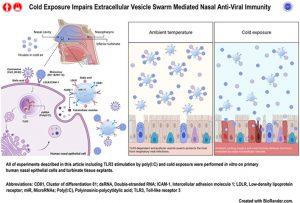In a recent study, scientists uncovered an immune response that fights off viruses that cause upper respiratory infections within the nose (Figure 1). Further research found that cooler temperatures impair this defensive response, increasing the likelihood of an infection.
The current study suggests a biological basis for the yearly seasonal fluctuation in upper respiratory viral infections, most recently seen during the COVID-19 pandemic. The nose is one of the first places where the interior of the body comes into touch with the outside world, making it a possible entrance site for microorganisms that cause disease.
In this study, it was discovered that when bacteria are breathed by the nose, the body’s innate immune system reacts by releasing billions of extracellular vesicles (EVs), which are small sacs packed with fluid that surround and kill germs. The goal of the current study was to find out whether viruses that cause some of the most prevalent upper respiratory illnesses may also cause this immune response when they are breathed through the nose. They discovered that each virus induced an EV swarm response from nasal cells, but by means of a different signalling route than the one employed to combat bacteria.
The researchers also found a mechanism at work in the defence against the viruses: Upon discharge, the EVs served as a fake, containing receptors that the virus would link itself to rather than the nasal cells. The next step was to evaluate how this reaction was altered by cooler temperatures, which is important for nasal immunity since the internal temperature of the nose is closely related to the temperature of the outside air it inhales. They discovered that the antiviral proteins in the EVs were compromised and that the amount of EVs released by the nasal cells had dropped by over 42%.
The nose has a newly discovered immune system of its own that is under continual attack, and the researchers have demonstrated what weakens this defence.
Journal article: Huang, D., 2022. Cold exposure impairs extracellular vesicle swarm–mediated nasal antiviral immunity. Journal of Allergy and Clinical Immunology.
Summary by Stefan Botha











